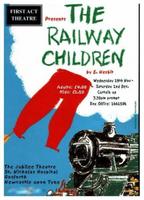 You’ve probably all seen the film. I first saw it in a local school hall or something like many moons ago. Then again on DVD most recently. Now I’ve read the book.
You’ve probably all seen the film. I first saw it in a local school hall or something like many moons ago. Then again on DVD most recently. Now I’ve read the book.The blurb at the front of the book says it’s never been out of print since it was first published in 1906 (happy one hundred years for 2006!). Well, what can you say after that confirmation of such longevity and popularity? Obviously, it’s one of those perennial classics. What makes such a classic? If I knew the formula I’d write one myself. In some ways, it has the same sort of status as The Wind in the Willows. At least when I came to the end of the novel, that was the other children’s novel that entered my head.
The story is of 3 children, Bobbie (Roberta), Phyllis and Peter, whose father is suddenly called away by a group of rather ominous men. With no male bread winner, the family finds itself suddenly poor and moves to an old house in the country. To help cope with all of this, there is the quite eccentric Mother. When they move into the new house, Peter complains at seeing a mouse run across the floor. Then Mother trills, ‘What fun!’, seeing this as an opportunity for adventure.
The whole feel of adventure and fantasy is further enhanced by the fact that the Mother is a children’s story writer. The children get a treat – buns – whenever Mother manages to sell a story. Thus an aura of making things up as you go along backgrounds the whole novel.
I guess the whole charm of the story comes, ironically, from the sense of freedom and adventure that results in the family being thrust into poverty. Having nothing forces the children to be creative and resourceful. For example, when they need things for their ailing mother, they put up a big advertisement to a passing train, then when the train stops, pass a note to an elderly passenger (talk about the kindness of strangers). This elderly man helps the family out in many ways, finally delivering their father to freedom.
I read this novel in one day. A book for those who love reading…
(The Chris Saliba Web Experience would like to thank Mr Chris Hubbard for the lend of his copy of The Railway Children, and for alerting me to the work of Mary Elizabeth Braddon.)
No comments:
Post a Comment